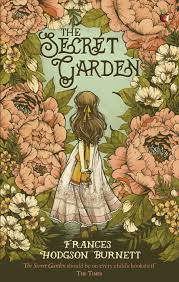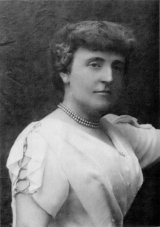The Secret Garden Page #23
The Secret Garden is a novel by Frances Hodgson Burnett first published in book form in 1911, after serialization in The American Magazine. Set in England, it is one of Burnett's most popular novels and seen as a classic of English children's literature. Several stage and film adaptations have been made.
“But the door was locked and the key was buried,” said Mary. “No one could get in.” “That’s true,” he answered. “It’s a queer place. Seems to me as if there’d been a bit o’ prunin’ done here an’ there, later than ten year’ ago.” “But how could it have been done?” said Mary. He was examining a branch of a standard rose and he shook his head. “Aye! how could it!” he murmured. “With th’ door locked an’ th’ key buried.” Mistress Mary always felt that however many years she lived she should never forget that first morning when her garden began to grow. Of course, it did seem to begin to grow for her that morning. When Dickon began to clear places to plant seeds, she remembered what Basil had sung at her when he wanted to tease her. “Are there any flowers that look like bells?” she inquired. “Lilies o’ th’ valley does,” he answered, digging away with the trowel, “an’ there’s Canterbury bells, an’ campanulas.” “Let’s plant some,” said Mary. “There’s lilies o’ th, valley here already; I saw ’em. They’ll have growed too close an’ we’ll have to separate ’em, but there’s plenty. Th’ other ones takes two years to bloom from seed, but I can bring you some bits o’ plants from our cottage garden. Why does tha’ want ’em?” Then Mary told him about Basil and his brothers and sisters in India and of how she had hated them and of their calling her “Mistress Mary Quite Contrary.” “They used to dance round and sing at me. They sang— ‘Mistress Mary, quite contrary, How does your garden grow? With silver bells, and cockle shells, And marigolds all in a row.’ I just remembered it and it made me wonder if there were really flowers like silver bells.” She frowned a little and gave her trowel a rather spiteful dig into the earth. “I wasn’t as contrary as they were.” But Dickon laughed. “Eh!” he said, and as he crumbled the rich black soil she saw he was sniffing up the scent of it. “There doesn’t seem to be no need for no one to be contrary when there’s flowers an’ such like, an’ such lots o’ friendly wild things runnin’ about makin’ homes for themselves, or buildin’ nests an’ singin’ an’ whistlin’, does there?” Mary, kneeling by him holding the seeds, looked at him and stopped frowning. “Dickon,” she said, “you are as nice as Martha said you were. I like you, and you make the fifth person. I never thought I should like five people.” Dickon sat up on his heels as Martha did when she was polishing the grate. He did look funny and delightful, Mary thought, with his round blue eyes and red cheeks and happy looking turned-up nose. “Only five folk as tha’ likes?” he said. “Who is th’ other four?” “Your mother and Martha,” Mary checked them off on her fingers, “and the robin and Ben Weatherstaff.” Dickon laughed so that he was obliged to stifle the sound by putting his arm over his mouth. “I know tha’ thinks I’m a queer lad,” he said, “but I think tha’ art th’ queerest little lass I ever saw.” Then Mary did a strange thing. She leaned forward and asked him a question she had never dreamed of asking anyone before. And she tried to ask it in Yorkshire because that was his language, and in India a native was always pleased if you knew his speech. “Does tha’ like me?” she said. “Eh!” he answered heartily, “that I does. I likes thee wonderful, an’ so does th’ robin, I do believe!” “That’s two, then,” said Mary. “That’s two for me.” And then they began to work harder than ever and more joyfully. Mary was startled and sorry when she heard the big clock in the courtyard strike the hour of her midday dinner. “I shall have to go,” she said mournfully. “And you will have to go too, won’t you?” Dickon grinned. “My dinner’s easy to carry about with me,” he said. “Mother always lets me put a bit o’ somethin’ in my pocket.” He picked up his coat from the grass and brought out of a pocket a lumpy little bundle tied up in a quite clean, coarse, blue and white handkerchief. It held two thick pieces of bread with a slice of something laid between them. “It’s oftenest naught but bread,” he said, “but I’ve got a fine slice o’ fat bacon with it today.” Mary thought it looked a queer dinner, but he seemed ready to enjoy it. “Run on an’ get thy victuals,” he said. “I’ll be done with mine first. I’ll get some more work done before I start back home.” He sat down with his back against a tree. “I’ll call th’ robin up,” he said, “and give him th’ rind o’ th’ bacon to peck at. They likes a bit o’ fat wonderful.” Mary could scarcely bear to leave him. Suddenly it seemed as if he might be a sort of wood fairy who might be gone when she came into the garden again. He seemed too good to be true. She went slowly half-way to the door in the wall and then she stopped and went back. “Whatever happens, you—you never would tell?” she said. His poppy-colored cheeks were distended with his first big bite of bread and bacon, but he managed to smile encouragingly. “If tha’ was a missel thrush an’ showed me where thy nest was, does tha’ think I’d tell anyone? Not me,” he said. “Tha’ art as safe as a missel thrush.” And she was quite sure she was. CHAPTER XII “MIGHT I HAVE A BIT OF EARTH?” Mary ran so fast that she was rather out of breath when she reached her room. Her hair was ruffled on her forehead and her cheeks were bright pink. Her dinner was waiting on the table, and Martha was waiting near it. “Tha’s a bit late,” she said. “Where has tha’ been?” “I’ve seen Dickon!” said Mary. “I’ve seen Dickon!” “I knew he’d come,” said Martha exultantly. “How does tha’ like him?” “I think—I think he’s beautiful!” said Mary in a determined voice. Martha looked rather taken aback but she looked pleased, too. “Well,” she said, “he’s th’ best lad as ever was born, but us never thought he was handsome. His nose turns up too much.” “I like it to turn up,” said Mary. “An’ his eyes is so round,” said Martha, a trifle doubtful. “Though they’re a nice color.” “I like them round,” said Mary. “And they are exactly the color of the sky over the moor.” Martha beamed with satisfaction. “Mother says he made ’em that color with always lookin’ up at th’ birds an’ th’ clouds. But he has got a big mouth, hasn’t he, now?” “I love his big mouth,” said Mary obstinately. “I wish mine were just like it.” Martha chuckled delightedly. “It’d look rare an’ funny in thy bit of a face,” she said. “But I knowed it would be that way when tha’ saw him. How did tha’ like th’ seeds an’ th’ garden tools?” “How did you know he brought them?” asked Mary. “Eh! I never thought of him not bringin’ ’em. He’d be sure to bring ’em if they was in Yorkshire. He’s such a trusty lad.” Mary was afraid that she might begin to ask difficult questions, but she did not. She was very much interested in the seeds and gardening tools, and there was only one moment when Mary was frightened. This was when she began to ask where the flowers were to be planted.
Translation
Translate and read this book in other languages:
Select another language:
- - Select -
- 简体中文 (Chinese - Simplified)
- 繁體中文 (Chinese - Traditional)
- Español (Spanish)
- Esperanto (Esperanto)
- 日本語 (Japanese)
- Português (Portuguese)
- Deutsch (German)
- العربية (Arabic)
- Français (French)
- Русский (Russian)
- ಕನ್ನಡ (Kannada)
- 한국어 (Korean)
- עברית (Hebrew)
- Gaeilge (Irish)
- Українська (Ukrainian)
- اردو (Urdu)
- Magyar (Hungarian)
- मानक हिन्दी (Hindi)
- Indonesia (Indonesian)
- Italiano (Italian)
- தமிழ் (Tamil)
- Türkçe (Turkish)
- తెలుగు (Telugu)
- ภาษาไทย (Thai)
- Tiếng Việt (Vietnamese)
- Čeština (Czech)
- Polski (Polish)
- Bahasa Indonesia (Indonesian)
- Românește (Romanian)
- Nederlands (Dutch)
- Ελληνικά (Greek)
- Latinum (Latin)
- Svenska (Swedish)
- Dansk (Danish)
- Suomi (Finnish)
- فارسی (Persian)
- ייִדיש (Yiddish)
- հայերեն (Armenian)
- Norsk (Norwegian)
- English (English)
Citation
Use the citation below to add this book to your bibliography:
Style:MLAChicagoAPA
"The Secret Garden Books." Literature.com. STANDS4 LLC, 2024. Web. 26 Nov. 2024. <https://www.literature.com/book/the_secret_garden_427>.




Discuss this The Secret Garden book with the community:
Report Comment
We're doing our best to make sure our content is useful, accurate and safe.
If by any chance you spot an inappropriate comment while navigating through our website please use this form to let us know, and we'll take care of it shortly.
Attachment
You need to be logged in to favorite.
Log In